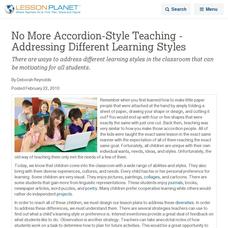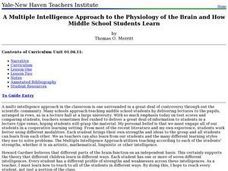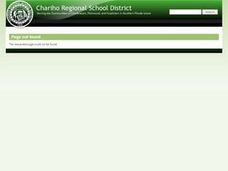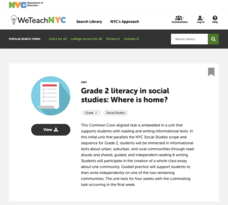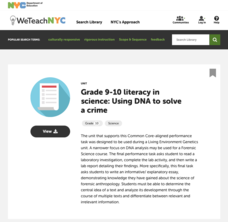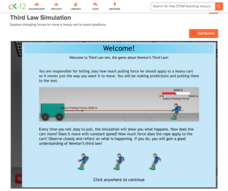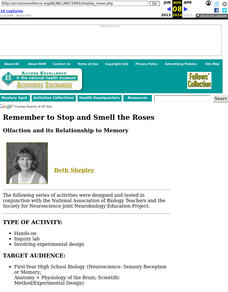Curated OER
No More Accordion-Style Teaching - Addressing Different Learning Styles
There are ways to address different learning styles in the classroom that can be motivating for all students.
Curated OER
Modals
Verbs can be tricky, especially those modal verbs of probability. Take a look at a wonderful 16-page workbook that uses think-pair-share, critical thinking, skills practice, and discussion to assist learners in using the correct modal...
Curated OER
Modals: Can, May and Will Verbs: Present Tense
Cover can, may, will, and shall with this lesson plan on using modals in the present tense. Starting off with a warm-up activity, the resource includes a text to analyze, examples of modals, and exercises with answers. The language in...
University of New Mexico
Visual Supports for Students with Autism Spectrum Disorder (ASD)
Because autism manifests in so many different ways it is referred to as Autism Spectrum Disorder (ASD). No one approach is appropriate for learners with autism. The idea of this packet if to provide a variety of approaches and materials...
Curated OER
Clouds
Incorporate art and poetry into an early elementary science lesson about cloud formation. With fun and engaging activities that follow a natural learning progression, youngsters will develop key vocabulary and conceptual understanding...
Kenan Fellows
Analyzing Speed from Different Modalities
Show us your moves. Using sensor equipment, scholars track the motion of different movements, such as jogging, skipping, or jump roping. They analyze velocity and acceleration and create graphs representing each movement.
Pearson
Conclusions: Must, Have (Got) To, May, Might, Could, Can't
Is this presentation the perfect addition to a grammar unit? It must be! Learn about drawing conclusions with different levels of certainty, using must, might, could, and can't.
Curated OER
Auxiliary Verbs
What is an auxiliary verb? Is that the same thing as a modal verb? Use this reference guide to explain each verb type to your emerging grammarians. While it is intended for native English speakers, you could use it with English language...
Curated OER
Personal Learning Profile
High schoolers investigate the life of Ghandi in order to find out how they learn. The choice of Ghandi was made because many students are not familar with him. Then student engage in different modalities of learning and take learning...
ReadWriteThink
Promoting Student Self-Assessment
Keep class members accountable for their own learning with a series of differentiated instruction strategies. From rubrics created by pupils to learning contracts written at the beginning of the year, the resource offers multiple ways...
Curated OER
A Multiple Intelligence Approach to the Physiology of the Brain and How Middle School Students Learn
Students draw a poster of a lateral view of the brain in order to label the different lobes of the brain. They examine what causes some people to be more musically intelligent than others. They dissect a cow's brain and label the...
Curated OER
Back to School
Students investigate the many ways of learning and examine classroom instructional techniques. They research the history of American Public Education.
Curated OER
M.I. Smart!
Learners will learn the skills necessary to create multi-media presentations and internet activities that demonstrate a deep understanding of their subject matter. Learning through a variety of unique experiences allows children to...
New York City Department of Education
Grade 2 Literacy in Social Studies: Where Is Home?
What makes a community? How communities differ? Young scholars research different types of communities, small rural towns, and large crowded cities. They respond to writing prompts, and write essays in groups to understand the wide...
Curated OER
The Power of Graphical Display: How to Use Graphs to Justify a Position, Prove a Point, or Mislead the Viewer
Analyze different types of graphs with learners. They conduct a survey and determine the mean, median and mode. They then identify different techniques for collecting data.
Teach Engineering
Exploring Bone Mineral Density
Bone up on bone density. The second installment of the seven-part series has pupils read articles on two different websites to learn about bone density and its measurement, as well as X-rays and other imaging tools. A quiz assesses their...
Curated OER
Idioms in Everyday Language
Students describe idioms and their use in everyday language. They describe the difference between literal and idiomatic meanings. In groups, students use iPhoto to create books that explain and illustrate a variety of idioms describing...
New York City Department of Education
Grade 9-10 Literacy in Science: Using DNA to Solve a Crime
Scholars become detectives and use science to solve a crime! A complete unit introduces DNA and includes hands-on activities that have learners model DNA and extract it from different food types. A culminating activity challenges...
CK-12 Foundation
Third Law Simulation
Keep calm and use the force! Joey pulls a cart and scholars adjust the force required to control the movement. Through simulating different scenarios, participants learn about Newton's Third Law. It includes analysis questions throughout...
Curated OER
Nonpoint Source Pollution in Long Island Sound
Students examine and identify the types of nonpoint pollution on Long Island Sound. In groups, they walk the shoreline, collect trash and identify its source. Using that information, they create a variety of graphs of the different...
Curated OER
It's All About the Roots
Students investigate the process of hydroponic agriculture. They grow beans in different hydroponic solutions, compare results and graph their observations.
Curated OER
Patriotic Music: Three Cheers for the Red, White & Blue
Students examine the patriotic songs of the 1940's and compare them to those of today. They identify elements that classify a song as patriotic, listen to several examples and complete Venn diagrams contrasting different examples.
New York City Department of Education
Peter’s Garden
Watch scholars' understanding of fractions bloom. The resource presents a performance task where the fractions are equal parts from the same whole, and mathematicians must use them to solve problems about a grade level garden. Teachers...
Curated OER
Remember to Stop and Smell the Roses: Olfaction and its Relationship to Memory
Students discover that olfaction elicits memory associations. They investigate how olfaction compares to other sensory modalities in the formation of memories. This is a hands-on lab activity guaranteed to build memories in your students!
